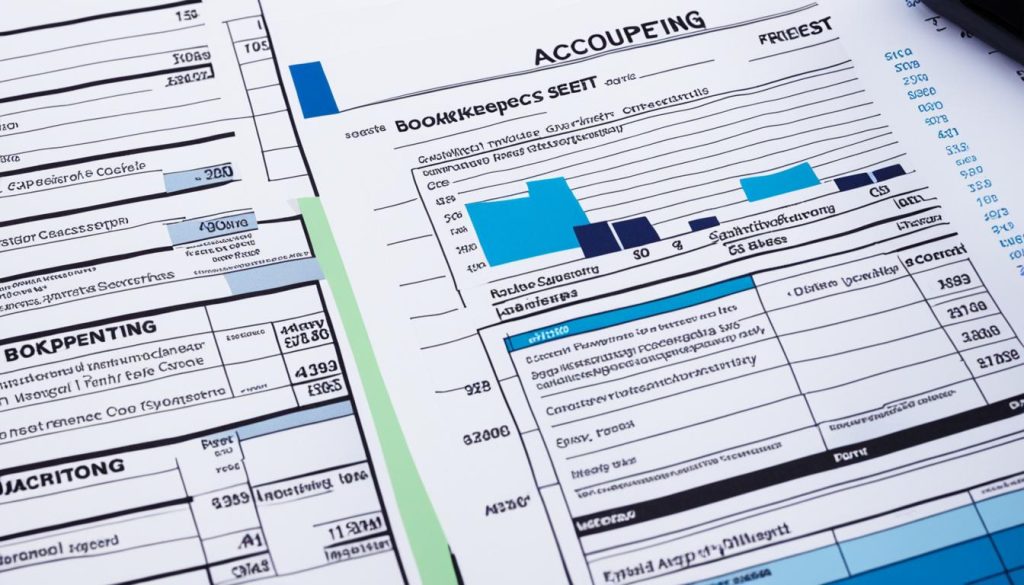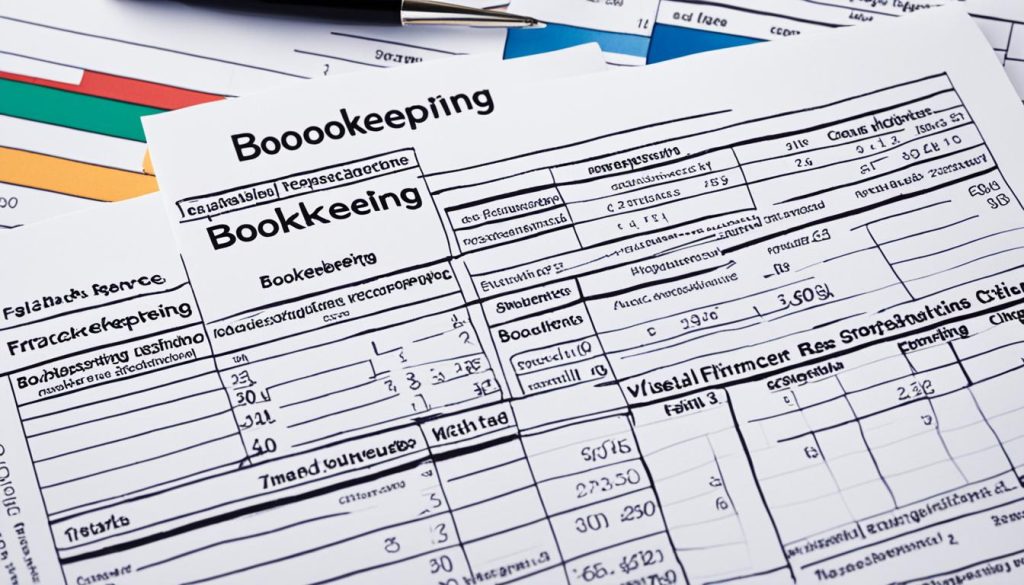Bookkeeping and accounting are essential aspects of financial management in businesses. While they both involve managing and analyzing financial data, there are significant differences between them. Understanding these differences is crucial for effective financial management in UK businesses. Stay tuned to learn more about the definitions, roles, and career paths in bookkeeping and accounting!
Key Difference Between Bookkeeping and Accounting
Definitions and Overview
When it comes to managing financial matters in a business, two terms often come to mind: bookkeeping and accounting. While they are closely related, they serve different purposes and play distinct roles in the financial management process.
What is Bookkeeping?
Bookkeeping is the daily process of recording and organizing financial transactions within a business. These transactions can include invoices, bills, and payroll. Bookkeepers are responsible for tasks such as data entry, reconciliation, and generating reports that show the financial status of a business. They ensure that all financial transactions are accurately recorded and categorized, providing a clear picture of the company’s financial health.
What is Accounting?
Accounting, on the other hand, is a broader field that uses the financial data provided by bookkeepers. Accountants analyze and interpret this data to gain insights into a business’s financial health. They prepare financial statements, such as income statements, balance sheets, and cash flow statements. Accountants also provide complex financial advice and often have expertise in tax laws, ensuring compliance and providing strategic guidance for decision-making.
Having a clear understanding of the definitions and roles of bookkeeping and accounting is essential for businesses to effectively manage their finances and make informed decisions.
The Role of Bookkeeping
Bookkeeping plays a vital role in ensuring the accurate recording and categorization of all business transactions within the accounts. Bookkeepers employ software such as Xero to maintain financial records effectively, carrying out quality control measures, such as bank reconciliation, to verify data accuracy. Their responsibilities also extend to generating monthly reports that provide business owners with insights into the financial performance of their companies.
Alongside data entry, bookkeepers often handle various additional tasks, including issuing and paying bills, managing payroll, and providing support for tax reporting. Their meticulous attention to detail and comprehensive understanding of financial processes are essential for maintaining up-to-date and accurate records. These responsibilities make bookkeepers indispensable in enabling businesses to meet their financial obligations and make well-informed decisions.
Bookkeeping Tasks
The day-to-day bookkeeping tasks can vary depending on the size and complexity of the business. Here are some common bookkeeping tasks:
- Recording financial transactions in the general ledger
- Classifying and categorizing expenses and revenue
- Performing bank reconciliations to ensure accurate balances
- Managing accounts payable and accounts receivable
- Processing payroll and ensuring compliance with tax regulations
- Preparing and filing VAT returns
- Generating financial reports and statements
Bookkeepers must be meticulous, detail-oriented, and proficient in using accounting software. Their expertise in managing bookkeeping tasks is crucial for maintaining financial integrity and enabling businesses to make informed decisions.

| Bookkeeping Responsibilities | Description |
|---|---|
| Data Entry and Record-Keeping | Recording financial transactions and maintaining accurate and up-to-date records. |
| Bank Reconciliation | Verifying the accuracy of bank balances by comparing them to the company’s records. |
| Financial Reporting | Generating reports and statements that provide insights into the financial performance of the business. |
| Payroll Management | Ensuring accurate payroll processing and compliance with tax regulations. |
| Bills and Invoices | Managing the issuance and payment of bills and invoices. |
| Tax Support | Assisting with tax reporting and ensuring compliance with tax laws. |
The Role of Accounting
In the realm of financial management, accounting plays a pivotal role in providing valuable insights and strategic guidance to businesses. Accountants, who possess specialized training in financial analysis and tax laws, are responsible for analyzing the financial data provided by bookkeepers and generating official financial reports. These reports, such as income statements, balance sheets, and cash flow statements, offer a comprehensive overview of a company’s financial health.
Accounting tasks encompass a wide range of responsibilities, including:
- Examining financial data for accuracy and completeness
- Preparing financial statements and reports
- Performing in-depth financial analysis
- Interpreting financial information to facilitate decision-making
- Providing complex financial advice tailored to the specific needs of the business
- Ensuring compliance with tax regulations
Accountants are skilled in utilizing financial data to identify trends, assess business performance, and forecast future outcomes. Their expertise aids in making informed decisions related to budgeting, investment opportunities, and risk management.
To illustrate the significance of accounting in driving strategic decisions, let’s consider an example. A manufacturing company, relying on the expertise of accountants, may use financial data to assess the profitability of various product lines. By identifying which products generate the highest returns, the company can make informed decisions about resource allocation, marketing strategies, and product development.
Accounting is a dynamic field that requires professionals to stay updated with constantly evolving tax laws and regulatory standards. Accountants are instrumental in helping businesses navigate through complex financial landscapes, providing practical management guidance to drive growth and maximize profitability. Their valuable contributions contribute to the success and longevity of organizations.
Key Variances Between Bookkeeping and Accounting
While bookkeeping and accounting are closely related, they have distinct functions and purposes within financial management for UK businesses. Understanding the key differences between bookkeeping and accounting is essential for effective financial management and decision-making.
Bookkeeping Functions
Bookkeeping is primarily concerned with the accurate recording and organization of financial transactions. Bookkeepers are responsible for performing tasks such as data entry, reconciling accounts, and generating financial reports. They ensure that all financial transactions are properly categorized and recorded in the company’s books. Bookkeeping functions mainly revolve around the administrative aspects of finance, ensuring that all financial data is accurately captured and organized.
Accounting Functions
Accounting, on the other hand, goes beyond the day-to-day recording of financial transactions. It involves analyzing and interpreting the financial data provided by bookkeepers to provide insights and advice. Accountants use the financial information to prepare official financial statements, such as income statements, balance sheets, and cash flow statements. They perform complex financial analysis and provide valuable strategic guidance to business owners based on their expertise. Accounting functions are more analytical and strategic in nature, focusing on interpreting financial data to support informed decision-making.
It is important to recognize that while there is overlap between bookkeeping and accounting, each has its own unique role and function within financial management. Bookkeeping provides the foundation for accurate financial records, while accounting takes on a more holistic and interpretive approach to analyze the financial data and provide valuable insights.

Contrasts Between Bookkeeping and Accounting
The contrasts between bookkeeping and accounting can be summarized as follows:
- Bookkeeping focuses on recording and organizing financial transactions, while accounting involves analyzing and interpreting the financial data for strategic decision-making.
- Bookkeepers perform tasks such as data entry, reconciliation, and generating reports, while accountants prepare official financial statements and provide complex financial analysis.
- The scope of bookkeeping is more administrative and transactional, while accounting has a broader perspective that includes financial analysis and strategic guidance.
Understanding these variances is crucial for organizations to effectively manage their finances and leverage the insights provided by both bookkeeping and accounting functions.
Collaborative Relationship Between Bookkeeping and Accounting
Bookkeeping and accounting work hand in hand to ensure accurate financial management. While they have distinct roles, they collaborate to provide valuable insights and informed decision-making.
Bookkeepers play a crucial role in maintaining accurate and organized financial data. They record and categorize financial transactions, reconcile accounts, and generate reports to track the financial status of a business. By meticulously managing the day-to-day financial tasks, bookkeepers provide a solid foundation of information for accountants to work with.
Accountants, on the other hand, bring a broader perspective to financial management. They use the data provided by bookkeepers to analyze and interpret the financial health of a business. With their expertise in financial analysis and tax regulations, accountants generate official financial reports and provide strategic guidance. Their insights help business owners make sound decisions and navigate complex financial scenarios.
It’s essential for bookkeepers and accountants to collaborate effectively to ensure accurate financial reporting. With reliable data from bookkeepers, accountants can perform in-depth analysis and identify financial trends or areas for improvement. This collaboration allows businesses to have a comprehensive understanding of their financial performance and make informed decisions for future growth.

For example, consider a retail business. The bookkeeper would record daily sales, track inventory, and manage cash flow. They would provide accurate data on the business’s revenue, expenses, and inventory levels. The accountant would then use this information to analyze the profitability of different product lines, assess the effectiveness of marketing strategies, and make recommendations for cost-saving measures. By working together, the bookkeeper and accountant ensure that the business has reliable financial records and can make informed decisions to drive success.
In summary, bookkeeping and accounting have distinct but complementary roles. Bookkeepers provide accurate and organized financial data, while accountants utilize this data to perform analysis and provide insights. Through effective collaboration, businesses can have a comprehensive understanding of their finances and make informed decisions to drive growth and profitability.
Career Paths in Bookkeeping and Accounting
Career paths in bookkeeping and accounting offer different opportunities and require different skill sets. Aspiring accountants typically pursue a bachelor’s degree in accounting and may become certified public accountants (CPAs). Accountants often offer more complex financial advice and have a deeper understanding of tax laws. Bookkeepers, on the other hand, can start their careers with relevant qualifications and experience in bookkeeping, without a formal degree. The pay for bookkeepers in the UK can vary depending on factors such as experience and location. While there are similarities and overlap between the roles of bookkeepers and accountants, bookkeepers should not be called accountants as their roles and responsibilities differ.
When considering a career in bookkeeping or accounting, it’s important to understand the differences and choose the path that aligns with your interests and goals. Accounting courses typically focus on advanced financial concepts, tax regulations, and accounting principles, preparing individuals for the complexities of the profession. On the other hand, bookkeeping courses provide training in areas such as financial record keeping, data entry, and the use of accounting software.
Bookkeeping and accounting assistants play important supporting roles in finance departments. While the two roles may have some similarities, they also have distinct differences. A bookkeeping assistant typically focuses on tasks like data entry, preparing financial reports, and managing accounts payable and receivable. On the other hand, an accounting assistant may assist with financial analysis, budgeting, and tax preparation, providing support to accountants in more complex financial tasks.
The salaries for bookkeepers in the UK can vary depending on factors such as experience, location, and industry. According to the Office for National Statistics (ONS), the median annual salary for bookkeeping and payroll clerks in 2020 was £26,600. However, salaries can range from around £18,000 to £40,000 or more, depending on factors such as experience and qualifications.
A common question that arises is whether a bookkeeper can be called an accountant. While there are similarities between the two roles, it’s important to understand the distinctions. Bookkeepers focus primarily on recording and organizing financial transactions, while accountants engage in more complex financial analysis, interpreting financial data, and providing strategic advice. Therefore, while bookkeepers play a crucial role in maintaining accurate financial records, they do not typically possess the same level of accounting skills and expertise as accountants.
Comparison of Bookkeepers and Accountants
| Bookkeepers | Accountants |
|---|---|
| Record and categorize financial transactions | Analyze and interpret financial data |
| Handle data entry, reconciliation, and report generation | Prepare financial statements, offer complex financial advice |
| Start career with relevant qualifications and experience | Pursue a bachelor’s degree in accounting |
| Focus more on administrative tasks | Engage in analytical and strategic activities |
| Should not be called accountants | Hold deeper accounting skills and expertise |
Both career paths offer opportunities for growth and advancement. Ultimately, the decision between becoming an accountant or a bookkeeper depends on individual skills, interests, and long-term goals. While becoming an accountant may require more education and qualifications, it can lead to higher-level roles and more complex financial responsibilities. On the other hand, bookkeeping offers a solid foundation in finance, with the potential to specialize in certain areas or advance to supervisory roles.

Conclusion
In conclusion, the difference between bookkeeping and accounting lies in their respective roles and functions within financial management. Bookkeeping focuses on the accurate recording and categorization of financial transactions, while accounting involves the analysis and interpretation of this data to provide insights and advice. Both bookkeeping and accounting are vital for effective financial management in UK businesses.
While there are similarities between the two disciplines, they require distinct responsibilities and skillsets. Bookkeepers play a crucial role in maintaining accurate financial records and generating reports, while accountants provide in-depth analysis and strategic guidance based on the financial information provided by bookkeepers.
For businesses, it is often beneficial to have both a bookkeeper and an accountant to ensure that financial records are accurate and up to date, while also having access to valuable insights for making informed decisions. Whether bookkeeping or accounting is better depends on the specific needs and goals of the business.





